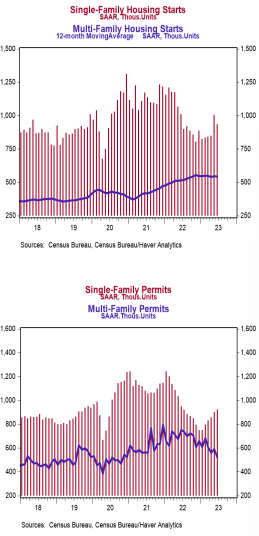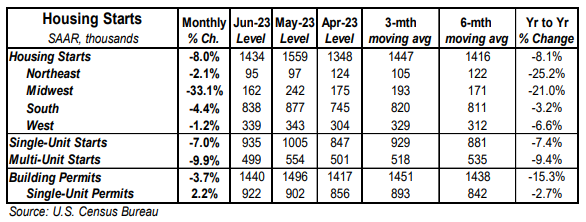- Housing starts declined 8.0% in June to a 1.434 million annual rate, below the consensus expected 1.480 million. Starts are down 8.1% versus a year ago.
- The drop in June was due to both single-family and multi-unit starts. In the past year, single-family starts are down 7.4% while multi-unit starts are down 9.4%.
- Starts in June fell in all major regions.
- New building permits declined 3.7% in June to a 1.440 million annual rate, below the consensus expected 1.500 million. Compared to a year ago, permits for single-family homes are down 2.7% while permits for multi-unit homes are down 31.2%.
Implications:
Housing starts took a breather in June following a surge in May. Looking at the details, the slowdown in construction was broad-based with all four major regions and both single-family and multi-unit starts contributing. While the data have been choppy recently, it looks like construction activity has bottomed and begun to recover. Keep in mind that many owners of existing homes are hesitant to list their homes and give up fixed sub-3% mortgage rates, so many prospective buyers have turned to new builds as their best option. This has boosted demand for developers and should help construction activity going forward. While 30-year mortgage rates continue to hover near 7% it looks like some of the sticker shock from the rapid run-up in financing costs last year is wearing off. This is good news for overall starts because single-family construction has been largely responsible for the decline in activity throughout the past year. It’s also important to remember that lots of projects were already in the pipeline. At present, the number of homes under construction is hovering near the highest level on record back to 1970. These figures also demonstrate a slower construction process due to a lack of workers and other supply-chain issues. Given that builders already have their hands full, it was not surprising to see permits for new projects fall 3.7% in June. While we don’t think housing is going to be a driver of economic growth in the year ahead, recent numbers are certainly not what you’d expect to see if there was a severe housing bust like the 2000s on the way, either.





